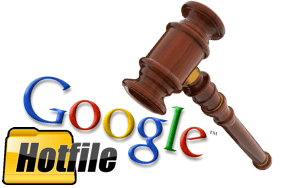Cyberlocker services are under attack from every direction: not only are their services looking less and less necessary as more personal file-sharing services (like Dropbox) become popular, but the services they do offer are viewed by the media industry as solely used for evil. In the wake of the Megaupload takedown, many cyberlocker sites are voluntarily shutting down, for fear of being sued or raided.
Hotfile is one of the sites in question, and they haven’t escaped the wrath of the MPAA. There are a couple lawsuits between the two pending, and most recently the MPAA tried to get the site shut down summarily. But Google has taken a sudden interest in the case and issued an amicus brief with some choice words for the MPAA’s tactics.
The brief is a bit jargon-y and full of footnotes and precedent, as legal documents often are, but the gist is perhaps best summed up by Google itself:
The DMCA requires plaintiffs to show that the service provider failed to act on knowledge of specific infringing material and puts responsibility for policing online infringement [primarily] on copyright owners.
(“primary” was printed, but “primarily” is clearly intended)
Google takes a sort of hard-line approach via the DMCA, telling the court that however the MPAA may try to mislead them, Hotfile is in fact protected under safe harbor provisions. And furthermore, Google suggests that the MPAA’s approach is contrary to the language in and precedents surrounding the DMCA. The onus is on copyright holders to alert a service to the nature and location of an infringement, and the service’s responsibility is to alert the user if possible and remove the material within a reasonable period of time.
Various examples of Hotfile and others allegedly not complying fully (e.g. removing one link to infringing material and not removing the file or alternative links) also get the whip. Why, they ask, should a file-hosting service do more than is asked of them by the law? They are complying with the letter of the law promptly and willingly, and if there are still infringing files being traded, it is up to the copyright holders to report them.
In other words, it doesn’t matter whether they know there is infringement going on. They could remove the file or link, but they’re not required to by law, and some would say it would be presumptuous of them to do so anyway. Why not give a file or link the benefit of the doubt? If it’s infringing, surely the copyright holder will request it to be taken down. At least, this is how Google frames Hotfile’s DMCA responsibilities.
While it would be nice to think that Google is White-Knighting in this case out of the goodness of its heart, that probably isn’t the reason. Google Drive, you’ll remember, is right around the corner. With the amount of space they will likely offer and the lack of restrictions (your files, privately or publicly shared, sync with any computer, etc), they might soon find themselves in a similar position as Hotfile. Certainly they already are to some extent, indexing as they do so much illegal content. But given recent events, the specific requirements (and specific things not required) for a cyberlocker service are very relevant to their interests.
Check out the full brief below:
[via Torrentfreak]
